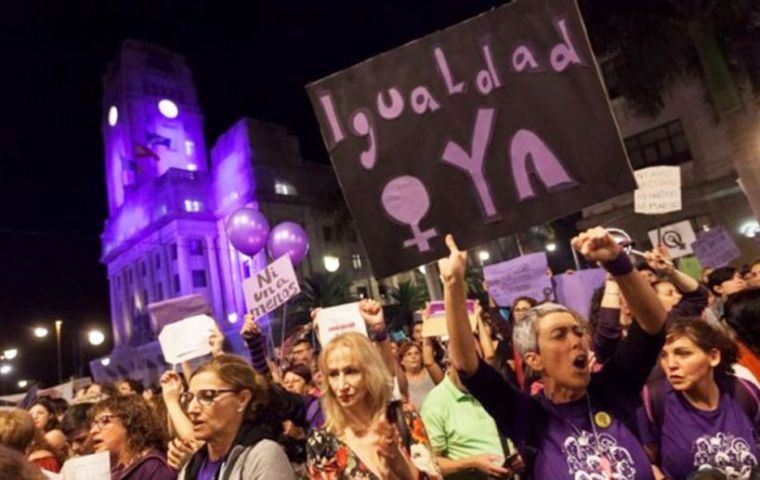MercoPress. South Atlantic News Agency
Not much to celebrate on Women's Day in Spain
 Last March 8, hundreds of thousands joined the country's first women's strike in protest at inequality between the sexes. One year on, the mood is different.
Last March 8, hundreds of thousands joined the country's first women's strike in protest at inequality between the sexes. One year on, the mood is different. Global campaigners are showcasing events to mark Women's Day on Friday (March 8) with the slogan 'a balanced world is a better world' - but in Spain, the gender equality debate is sowing divisions that appear deeper than ever.
Last March 8, hundreds of thousands joined the country's first women's strike in protest at inequality between the sexes. One year on, the mood is different.
In a society where the emergence since then of Vox, a new far-right party, is tapping into pockets of nostalgia for a staunchly traditionalist past, women's rights have become a pivotal topic in campaigning for national elections due on April 28.
Vox opposes a landmark law on gender violence that Spain passed in 2004.
In a video it posted on social media, some of its female supporters compared feminism to an “ideological burqa” and brandished “Don't speak in my name” placards in protest at the strikes, rallies and other events planned for Friday.
A smaller, ultra-conservative group this week drove buses around Spain flanked with the slogan #StopFeminazis.
Both groups say the 2004 law, which protects women from violence from partners or ex-partners, discriminates against men. They want it scrapped and replaced with legislation covering all forms of domestic violence.
“We won't take part in the March 8th feminist strike because it denigrates women by treating them as weak and helpless people,” tweeted Vox.
Prime Minister Pedro Sanchez's outgoing Socialist government, meanwhile, wants the law reinforced, while opinions in the mainstream conservative People's Party (PP) opposition are divided.
Opinion polls expect Vox, which also opposes abortion, to become the first far-right party to win seats in the lower parliamentary house - possibly up to one in seven - in four decades.
Part of its success is down to the way it has tapped into resentment in some quarters against years of focus on women's rights and violence against women. Some 70 per cent of its backers are men, a GAD3 poll published in January showed.
“Vox is a community of voters that is reacting against feminism,” said Belen Barreiro, director of the 40DB research institute.
Killings of women at the hands of current or ex-partners systematically get prominent coverage in Spanish media, and hundreds of thousands took part last year in protests over a court's ruling on a gang rape that many judged too lenient.
A Metroscopia survey in February showed 77% of Vox voters consider that Spain's gender violence laws have left men vulnerable. That compares with a still eye-catching 44% of voters of all political stripes.




Top Comments
Disclaimer & comment rulesCommenting for this story is now closed.
If you have a Facebook account, become a fan and comment on our Facebook Page!